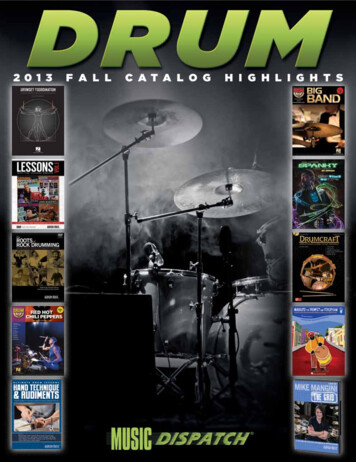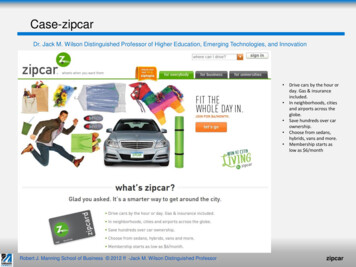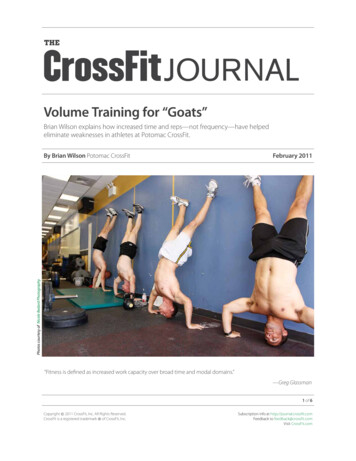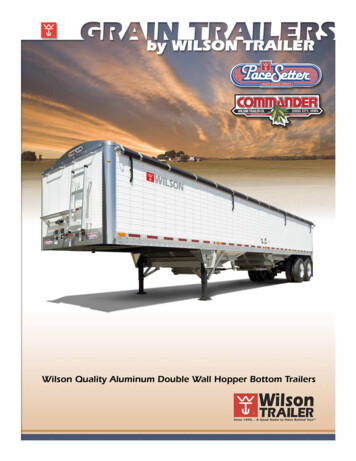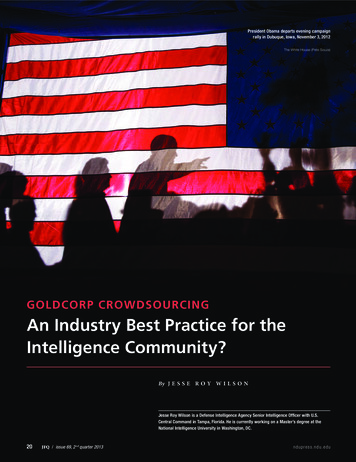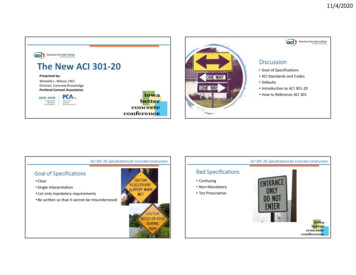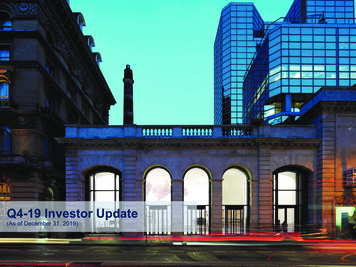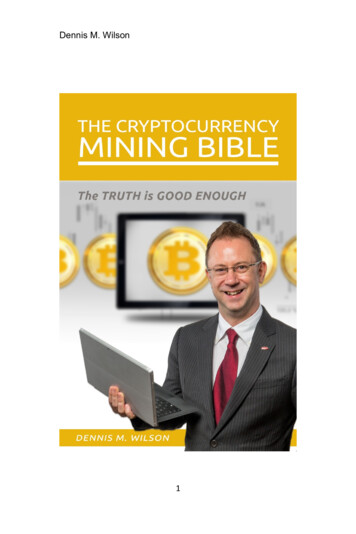
Transcription
Dennis M. Wilson1
The Cryptocurrency Mining BibleThe Cryptocurrency MiningBibleBy Dennis M. Wilson of CryptEdu.com a division ofInternetnextstep.com Consulting Ltd.This Living Book v1.3 was Created on:Monday, November 20, 2017 and is licensedto:Market NexusCheyenne, Wy307-352-9552
Dennis M. WilsonThis Book is NOT FREE Internetnextstep.com Consulting Ltd.http://www.InternetNextStep.comThis is a living book constantly beingupdated and revised by CryptEdu.com aCryptocurrency Education company.If after reading it you like it, pleasepurchase a license from:www.CryptEDU.comYour license gives you re-print and reseller rights. You mayNOT copy and paste portions of this book without writtenauthorization.For more information about what a living book is and thebenefits of it, please go to the last page of this living book.Get your Hard Copy of this book from AmazonInterested in Cryptocurrency Mining?Check out: www.CryptMin.com3
The Cryptocurrency Mining BibleContentsWhat is Crypto Currency?.8Buying Cryptocurrency.10Understanding Wallets.10Desktop Wallets.11Mobile Wallets.12Online Wallets.13Hardware Wallets.14Paper Wallets.14Buying, Sending, and Receiving.15Mining.16The Stakes of Becoming a Miner.18Choosing the Mining Method Best for YOU.18Cloud Mining.19Solo Mining with PC or Mining Rig.20Mining Pools.21The Race is On.22Cloud Mining Services.24The Real Cost of Mining.25Buying a Cloud Mining Contract.27Co-Locaton Hosted Mining.27Cloud Based Mining.27Leased or Rented Hashing Power.30Currency and Hash Rates.31
Dennis M. WilsonMining Pools Using Laptops and PCs.33Choosing Your Mining Pool.35Pool Size.36Reward Structure.36Currencies.37Mine Individually with Your Mining Rigs.39Type of Currency.40Electricity Cost.41Profit.43Nothing Ventured, Nothing Gained.44Joining Pools with Your Own Mining Rigs.45Your Mining Rig and the Pool Size.46Your Mining Rig and the Pool’s Reward Scheme.48Proportonal (PROP).49Pay per Last N Shares (PPLNS).49Choosing the Right Mining Rigs for Pool Mining.50How to Maximize Profits with Cloud Mining.51What Profit to Expect?.51Cryptocurrency Cloud Mining is Risky.53Cloud Mining vs. Real World Mutual Funds.55The Elephant in the Room.58Finding the Best Cloud Mining Company.59Determining Cloud Mining’s Profitability.62Comparison of Cloud Mining Companies.635
The Cryptocurrency Mining BibleGenesis Mining.64CryptMin.64Hashing24.65Hashfare.65Mining Solutons for PCs and Laptops Altcoin Pool Miners.67Mining Pools.67The Major Shif to Minor Altcoins.69Choosing the Right PC or Laptop for Pool Mining.69Keep Tabs on Minor Altcoins for Profitability.70Mine Safely.71Popular Mining Pools.72Non-China.72China.72AFTER you Have Successfully Mined Coins?.73What is a Cryptocurrency Exchange?.73Types of Crypto Currency Exchanges.73Exchange Fees.74Before Signing up to an Exchange.75Cryptocurrency Exchange 86Canada.87
Dennis M. WilsonCoinpayments.87Quadrigacx.87Cryptocurrency Debit Cards.88How They Work.88MLM Crypto Currency Mining.90What is a Living Book?.917
The Cryptocurrency Mining BibleWhat is Crypto Currency?Bitcoin, Ethereum, Litecoin, Dash, Ripple and manymore, you have likely heard some of these names inthe last 12 months. These are all examples of CryptoCurrencies and they all operate on a decentralizedcomputer network and software called the Blockchain.Unlike traditional, “fiat” currencies like the USD, theEuro etc. which governments can arbitrarily increasethe money supply and all transactions are centralizedin the banking system, Cryptocurrencies are notcentrally controlled and follow a firm set of rules putinto existence at time of creation, and very difficult tochange unless you get a majority buy in of thedistributed network’s computers and servers thatcontain the blockchain.The blockchain essentially is the transaction ledger ofall transactions and it eventually like in the case ofBitcoin or Ethereum exists on hundreds of thousandsof computers and servers around the world.Why?Why would people keep this ledger on their serversand computers for free?The simple answer is MINING!What is Mining?Well, as this is an entry level crypto currency course,we will keep it in very easy terms.
Dennis M. WilsonFor the blockchain to operate, all transactions need tobe verified by a certain number of nodes of thedistributed network. This ensures nobody cheats andchanges the ledger of their own node. If they did, thetransaction would fail as it could be proven fraudulentas it would not be able to find 4 other machinesrandomly to verify it is real.If you agree to host the “blockchain” on yourcomputer, or on a “mining rig”, the purpose is for youto solve a very complicated mathematical equationthat is used in the secure verification process of eachtransaction. Confirmation of the transactions isparamount to the blockchain operating securely.The reason people do the mining is the BlockReward. If you successfully mine a block, you get areward. Currently the Bitcoin block reward is 12.5coins, or at the time of this writing August 18, 2017, 4300 USD/Bitcoin x 12.5 53750!This becomes very economical if the difficulty to minecosts less in electricity and crypto mining rigmaintenance than the reward provides.This is the essence of the blockchain, and why Cryptocurrency mining exists.9
The Cryptocurrency Mining BibleBuying CryptocurrencyThough this book is about cryptocurrency mining, youwill likely find your first step is to first BUY someBitcoin or other coin in order to purchase a miningcontract or mining related materials.Taking a course in cryptocurrencies won’t becomplete without a detailed, in-depth understandingof how cryptocurrency wallets work and how they areused to buy, store, sell, send and receive yourcurrencies from one wallet account or device toanother. This chapter delves into the specifics ofcryptocurrency wallets and how you can start buyingand making transactions with them.We will cover the technology and concept behindwallets, different kinds of wallets with their pros andcons, conducting day to day transactions, and adetailed step-by-step information from opening and/orinstalling electronic wallets, and making your first buy,send, or receive in the Exchange section of this book.Understanding WalletsWhen Satoshi Nakamoto (whether he’s a real personor not is still unknown), created Bitcoin, he had theconcept of a Bitcoin ‘client’ which could ‘store’ theBitcoins of users and miners apart from theblockchain ledger containing all the records of Bitcointransactions from the very first day it got created. ThisBitcoin ‘client’ was appropriately called ‘wallet’ by thecreator himself.
Dennis M. WilsonThe blockchain ledger keeps all the record of howmuch Bitcoin a person currently has and how much ofit was sent or received, along with other millions ofother users and their transactions in thecryptocurrency network. Wallets provide a quick andeasy way to buy, store, sell, send, or receivecryptocurrencies without users having to accessdirectly or download the entire blockchain ledgeritself.Some wallets store the entire blockchain such asdesktop wallets. Desktop wallet users have full controlover their currencies because they have ownership ofthe private keys used for sending currencies, andgenerating public keys when requesting or receivingthem.Mobile wallets also function like desktop walletsallowing users to have their own private keys butwithout having to download the blockchain ledger.Online wallets, on the other hand, can only allowusers to create or request public keys using thecryptocurrency address and the users’ private keyskept from them in their servers.There are basically 5 kinds of wallets:Desktop WalletsAs the name implies, these wallets ‘store’ all yourcryptocurrencies in your desktop’s hard disk or SSD.Creating your own desktop wallet requiresdownloading and installing the app, and downloadinga partial or full blockchain ledger (this essentially turnsyour desktop into a full node).11
The Cryptocurrency Mining BibleThe network will generate your private key whichserves as a unique identifier each time a transactionis made. From this, a public key can be generatedand serve as the wallet’s address when requesting orreceiving currencies.Since technically all of your cryptocurrencytransactions are kept in blockchain ledgers spreadacross the cryptocurrency network, you could stillrebuild your wallet and recover your currencies incase of theft or physical damage as long as you haveyour private keys with you or if they have not beencompromised.Notable examples of desktop wallets include BitcoinCore (bitcoin QT wallet) for Bitcoin and MyEtherWallet(MEW) for Ethereum blockchain.Mobile WalletsThese wallets are apps installed directly to mobiledevices such as tablets and smartphones. They’revery straightforward and easy to use, making them anideal wallet for beginners.Storing the blockchain ledger isn’t necessary sincewallet servers maintain one or more of thesedepending on how many currencies they support, andupdates the blockchain ledger with your wallet everytime a transaction is made. It also allows you to haveyour own private key upon installation.Due to weak passwords used in most mobile wallets,they can be hacked in case of theft or unauthorizeduse. And because your private keys are stored in your
Dennis M. Wilsonmobile wallets, hackers can send all of yourcurrencies to their wallet account using them.Currencies stored in damaged or stolen mobilewallets can still be retrieved as long as the owner hassecured a copy of his private keys, or if they have notbeen compromised. A record of all your transactionsare kept in the blockchain ledgers scattered all overthe network. All you need is your private key toreconstitute your wallet.Notable examples include MyCelium, Breadwallet,and Copay.Online WalletsThese wallets don’t require installation or physicalstorage and can be accessed through a web browseron any desktop or mobile device such as tablets orsmartphones. Simple and easy to use for beginners,much like the mobile wallets.However, unlike mobile wallets, users don’t haveaccess to their private keys but can only request thewallet server to generate a public key for them (byclicking a button or tab, etc.) when receivingcurrencies from other wallets to their account. Whensending cryptocurrencies, the online wallet would usethe private keys stored in their servers (not visible oraccessible for online wallet users).This carries some risks to online wallet users as theyhave no control over their private keys. (Some usersoften confuse the online wallet account name and/orpasswords used to access their wallet accounts withthe private keys which identify users in the13
The Cryptocurrency Mining Biblecryptocurrency network when making transactions.These two are entirely different and are not in anyway related).Hence, you need to research a reputable, trustworthy,and secure online wallet you can depend on, orconsider some other options such as sending some ofyour currencies to a separate mobile or hardwarewallet.Notable examples include Coinbase, Gemeni, andBlockchain.info.Hardware WalletsAs the name implies, these wallets are small pieces ofhighly sophisticated devices designed specifically cies. Transactions are made within thedevice itself and uses bank-level security whichrenders any attempt by hackers virtually useless.Popular examples include Trezor and Nano Ledger S.Paper WalletsPut simply, a printout of your private and public keysand a QR-code in any piece of paper, used whentransacting with a QR scanner, mobile camera phone,or by typing the private and public keys to computeror mobile device. Paper wallets are 100% secure andhack-free, as long as no one else gets hold of it.
Dennis M. WilsonBuying, Sending, and ReceivingWhen a wallet account sends currencies to anotherwallet, this transaction is broadcast all over thecryptocurrency network and are validated by thenodes, i.e. online computers with complete copy ofthe updated blockchain ledger. Determining its validitywill depend on the following: valid private keythe sender’s digital ID(hashed) valid public keythe receiver’s address(hashed) sender’s balance theactualno.ofcurrencies the sendercurrently has, or a fractionthereof amount to be sent actual no. of currencies tobe sent by the sender or afraction thereof. (shouldnot be greater thansender’s balance)Once validated, it will be added onto a vast pool oftransactions waiting for inclusion into one of theblocks which miners compete in solving, after whichthe block, containing all the valid transactions,becomes a permanent record of the entire blockchainledger. Hence, the valid transaction is “confirmed”once it becomes a part of the blockchain.It usually takes around from ten to 60 minutes for avalid transaction to be confirmed, as with the case ofBitcoin. As more blocks are solved on top of it, themore ‘permanent’ it becomes and the less likely it is to15
The Cryptocurrency Mining Biblebe invalidated by a competing blockchain in case of a51% attack.When buying cryptocurrencies, one needs to have awallet to serve as a conduit for exchanging fiat withcryptocurrencies. This often creates a confusion as towhat exactly a wallet and an exchange is. But forsimplicity sake, wallets are used primarily for storingand buying cryptocurrencies with fiat; exchanges onthe other hand are used for trading cryptocurrencieswith a different kind or even fiat as way of earning anincome.Some people buy and sell their cryptocurrencies inexchanges, which is perfectly okay. However, it doestake more time and is a little complicated than justbuying them through your wallets.MiningSince the advent of decentralization by way ofCryptographic digital currency utilizing the Blockchainin the year 2009, and the growing popularity ofalternative cashless transactions in the global market,there is no denying that cryptocurrency is becomingmore accepted as a legitimate mode of exchange forgoods, services, and other commodities. Whether ornot this form of digital currency could reachwidespread circulation is not a question of probabilitybut of time.Data suggests a growing number of people gettinginvolved both in the production of cryptocurrenciesand its usage as can be seen with the increase intheir circulating supply, volume, and relative value, aswell as the proliferation of mining pools, mining
Dennis M. Wilsoncontracts or services, mining architectures and mininghardware (mining ‘rigs’).This is turning out to be especially true withsecondary type currencies, also known as ‘altcoins’because of the relative ease by which they can bemined compared to the primary, but more difficult tomine, ‘bitcoin.’Unlike traditional fiat money issued in banks, thesecrypto currencies will reach a supply limit (like 21million BTC), at which point no additional units can bemined or added and their total number in circulationwill become permanent. From a traditional standpoint,this makes such currency virtually resistant toinflation. However, nothing is set in stone when itcomes to their current relative value as the rate ofmining, ‘minting’, and coin-buying is, as of thismoment, very dynamic and subject to a lot of internaland external factors.Thus, venturing into the competitive and highlycomplex world of cryptocurrency mining requires asolid educational foundation about the ins and outs ofthis fledgling industry in order to make the mostprofitable investments in your mining method ofchoice.It requires a basic understanding on how theblockchain mining system works, and some conceptsabout valuation and trading to guide you on whichcurrency to bank your mining hardware and money onat any particular point in time. It is a very fluid industryand what made one person a fortune yesterday, canlose another a fortune today. Just like mining for goldand other precious gems or metals.17
The Cryptocurrency Mining BibleThe Stakes of Becoming a MinerThe prospect of making a fortune with cryptocurrencymining is not a far-fetched idea. For instance, wayback in 2010, bitcoins went largely unnoticed andunheard of, owing to its low value when converted tofiat currency and total lack of understanding coupledwith perceived risk of getting involved. (10,000 BTC 40 USD). Reportedly, one person used this currencyto buy two pizzas with 10,000 BTC valued at 40 USD.Six years later, that value of those 10,000 bitcoinsskyrocketed to more than 20 million USD.Nowadays, more currencies are emerging, and someof them are starting to exhibit promises of increase invalue relative to other currencies. As more people getinvolved and the processing power of miningtechnology improves, the possibility of striking theproverbial oil pit or gold mine may be just around thecorner. It also may not be.However, much like mining for real gold, there arestakes involved; you stand to lose money if you’re notaware of the pros and cons of each method and theability to make wise decisions on which currencieswould be the most profitable ones to mine.The cost of electricity and capital cost of your miningrig could easily cost more than the crypto currencyyou are mining, meaning you could lose all or part ofyour investment in mining rigs and electricity.Choosing the Mining Method Best for YOU
Dennis M. WilsonBefore mining became a widespread practice, peoplerelied heavily on individual mining using their ownhardware to calculate blocks of information on opensource mining applications. These applicationsemploy hash functions and specific algorithms toverify each block before they can be integrated into ablockchain, which is essentially a bunch oftransactional data linked together into a series ofencrypted information which can’t be reasonablydecrypted or altered.However, as more and more blocks are mined andintegrated into the blockchain, verifying each blockbecomes increasingly difficult to the point where asingle miner, with his limited resources andprocessing power, cannot produce enough hash rateto verify bigger chunks of data and still make a profitfrom it.This led to the creation of alternative mining methodssuch as rental contract mining, cloud mining services,mining pools, collocated mining facilities, and variouscombinations of these methods.Without going into all the details on how each systemworks right now, we will begin by introducing you tothe four most common ways to participate in this‘mining expedition’ with or without your own dedicatedcrypto currency mining rig.Cloud MiningSigning up to cloud mining service is probably theeasiest way to start earning crypto currencies. Itdoesn’t require any hardware except your regular PC,laptop, or smartphone. You’re essentially renting a19
The Cryptocurrency Mining Bibletiny part of a large mining facility which runs all ucture and software.They support multiple platforms and allow you tochoose which currencies you wish to spend yourmoney on.However, it does involve some research especiallywhen establishing the credibility of a certain cloudmining service. Furthermore, you need to be able todecide which currency would yield the most outputbefore parting with your hard-earned money. In bothinstances, you’ll benefit a lot from this method bymaking informed decisions instead of making randomchoices. Genesis Mining is one great example of acloud mining service.Solo Mining with PC or Mining RigThis is likely the least effective way to participate inthe crypto currency gold rush we see and hear aroundus. Fun as a hobby, yes. Actual return on investmentin a reasonable time frame. Not likely.While it is possible to do, there are a few significantdrawbacks.The first is your personal PC is not likely strongenough to earn a return after electricity unless you aremining an obscure Altcoin. Even then you would needto solve the equation yourself and get the entire blockreward. The statistics on this happening with all butthe newest and potentially valueless coins are not inyour favor. You would be hoping to win a reward of acoin that one day skyrocketed in value as you would
Dennis M. Wilsonnot earn a return after machine wear and tear andelectricity cost in the short term.Should you go with a mining rig, which can costanywhere from 2000 to 6000 you “may” haveenough hashpower to earn the reward on an altcoinall on your own, but it may take 6 months or a year todo so. Granted the reward would be potentially large,but will it be large enough to earn a profit?You may want to consider a mining pool to increaseyour chances of earning with your own PC or a miningrig.Mining PoolsJoining a mining pool and participating in miningactivity using your own computer is a more viableoption (but not much due to limitations of yourcomputers power and relative inefficiency whencompared to a dedicated mining rig) if you want toearn a small income without having to spendthousands of dollars on a dedicated mining rig. Itallows more control of your mining efforts comparedto a cloud mining contract and has the potential ofcompeting against large scale miners as it iseffectively a huge amount of combined processingpower consisting of all the miners who put theirresources into the pool on a global scale.Mining pools have a systematized way of rewardingeach participant and it is different from one pool toanother. Some examples include Pay-per-Share,Proportional, and Bitcoin Pooled mining. In any case,you will receive a portion of the reward commensurate21
The Cryptocurrency Mining Bibleto your contributed hashpower during the blocksolving process.Another advantage of mining pools is you only haveto pay a very small amount to join the pool and someeven offer it for free and take a percentage of thereward. The only drawback is sometimes you have noway of telling if your own mining machine, in this caseyour PC or laptop, is performing well enough or iscapable of handling the task when it comes to solvingbigger blocks of data at a certain hash rate.Joining a mining pool with your own mining rig is avery promising method to maximize your miningefforts because it allows you to have the best of bothworlds. First, you’ll be able to verify blocks muchfaster as a result of combining your processing powerwith all the other participants in the mining pool.Secondly, you’ll have more flexibility and greateroptions for what coins to mine with your rig.The Race is OnAs years progress, more and more people will becompeting in a mad dash to mine every single cryptocurrency until the final piece of every blockchain issolved. Fortunately, new crypto currencies hit themarketplace daily, and that rate is only likely toincrease as the digital gold rush continues.Hardware and software companies are now takingpart in the arms race to produce faster, more powerfulmining infrastructures, while on the other side of thebattlefield are individual miners in mining pools,people joining forces in a combined effort topropagate the coin industry and earn their own piece
Dennis M. Wilsonof this revolution which is paving the way to a new eraof inexpensive cashless transactions.Start your journey by educating yourself about thebenefits of adopting cryptocurrency in day to daytransactions. Learn the basics on how to navigate theintricacies of mining and find the best possibleoutcomes in every situation by following certain rulesand principles governing them. Mining, much like anyother skill is acquired through patience and consistenteffort.Now let us get into a deep dive on the crypto currencymining concepts and methods we have justintroduced to you.23
The Cryptocurrency Mining BibleCloud Mining ServicesMining can be very daunting, especially for an absolutebeginner. Even if you have your own resources or thecapability to mine on your own, you still must understand alot of factors which can drastically affect your miningefforts. The smartest way forward may be to employ theservices of expert miners who possess all the technicalknow-how of cryptocurrency mining, state-of-the-art miningfacilities, and years of providing reliable mining services toclients.Cloud mining services offer a quick solution to ordinarypeople who want to participate in cryptocurrency miningand be able to earn income without spending thousands ofdollars on mining rigs and computing hardware. Iteliminates the problem of having to be responsible forexcessive monthly bills on electricity and mining rigmaintenance, not to mention dealing with the heat andnoise of the physical rigs if you are trying to do it in yourbasement.Not surprisingly, it is the method of choice of over 500,000subscribers worldwide to a single cloud mining service,and there are more than 1.To get you started, we need to understand manyinterrelated factors that will determine how much you canpotentially earn after taking all aspects of the miningprocess into consideration. However, before venturing intoany kind of cloud mining service, be sure to verify thecredibility of the cloud mining company. Are they legit? Arethey consolidators or resellers? Do they exist as a physicalmining operation somewhere? (some pseudo-miningcompanies are nothing more than sophisticated Ponzischemes).
Dennis M. WilsonThe Real Cost of MiningMining costs money. Beyond the cost of setting up yourown rig powerful enough to compete with other miners ona global network which means buying expensive hardwareand running it at full speed 24 hours a day, seven days aweek. Operational costs with the biggest one being thecost of electricity where your mining rig is located woulddepend on the type of mining equipment being used andmaintaining the best possible conditions for the rig.A custom-built DIY rig which use multiple GPUs (6) runningat
The Cryptocurrency Mining Bible Buying Cryptocurrency Though this book is about cryptocurrency mining, you will likely find your first step is to first BUY some Bitcoin or other coin in order to purchase a mining contract or mining related materials. Taking a course in cryptocurrencies won
